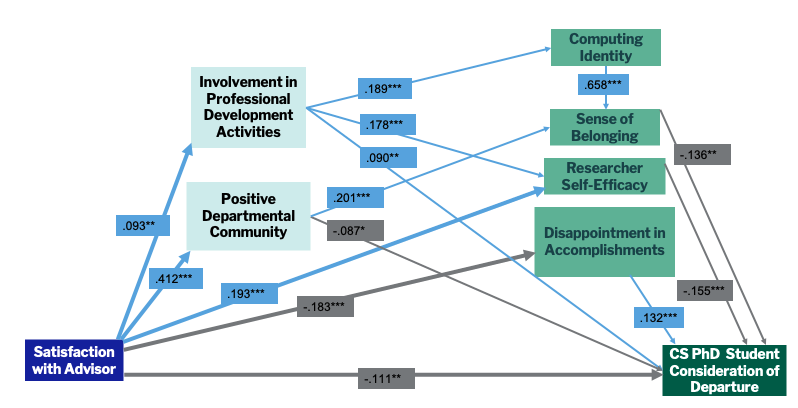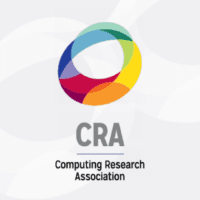CERP Infographic: How Do Faculty Advisors Shape CS PhD Student Outcomes?
By Kari George, Postdoctoral Fellow at the University of Illinois Urbana-Champaign
Persistent equity gaps in computing doctoral degree attainment motivated a new study that examined what influences students’ consideration of departure. As an important precursor to their decisions to stay or leave their programs, understanding what shapes students’ thoughts of leaving is critical to supporting a robust graduate population.
As described in the September issue of Computing Research News, Drs. Kari George and Kaitlin Newhouse used data from the 2018 CERP Graduate Student Data Buddies Survey to test a conceptual framework of doctoral students’ consideration of departure. Using structural equation modeling and data from nearly 1,100 students across more than 100 research universities, the framework included important psychosocial characteristics known to be important to students’ educational and career trajectories throughout computing, such as sense of belonging in computing, computing identity, and researcher self-efficacy, among others.
The full conceptual framework and findings from the study are available in this article, published in Research in Higher Education. Summarized below is an excerpt of the framework, highlighting the critical role of faculty advisors and how they influence PhD students’ experiences and outcomes.

Figure 1: An excerpt from the conceptual model of computing doctoral students’ consideration of departure. Standardized beta coefficients for each path are shown in the gray and blue boxes, with blue being a positive predictor and grey being a negative predictor. All path coefficients are significant at p<.05.
Students who were more satisfied with their advisors were more involved in professional development activities, had more positive perceptions of the departmental community, and reported higher researcher self-efficacy. Greater satisfaction with faculty advisors also served as a protective factor because it reduced students’ disappointment in their accomplishments, and reduced the likelihood that students considered departure. Additionally, this model shows both what satisfaction with advisors directly influence, as well as indirect paths of influence. For example, greater satisfaction with advisors enhances researcher self-efficacy, which then reduces the likelihood of students’ consideration of departure.
The research suggests advisors are important because the student-advisor relationship influences what students do, how students feel in the computing community, how students see themselves, and ultimately, whether they consider leaving their programs. Computing departments and faculty members are encouraged to cultivate stronger relationships between faculty and PhD students. Recommendations for how to engage in quality mentorship practices can be found in resources such as the Equity-Minded Mentorship Toolkit.
Notes:
The measure of Satisfaction with Advisor was computing using factor analysis (ɑ = 0.871) from three items that asked students about their satisfaction with how often they meet with their advisor, the guidance their advisor provides, and the career advice their advisor provides (factor loadings of 0.746, 9.956, and 0.803 respectively).
The survey data analyzed for this infographic were collected by the Center for Evaluating the Research Pipeline via The Data Buddies Project. CERP provides social science research and comparative evaluation for the computing community. Subscribe to the CERP newsletter here. Volunteer for Data Buddies by signing-up here.
This material is based upon work supported by the National Science Foundation under grant numbers [#2030859, #2137647]. Any opinions, findings, and conclusions or recommendations expressed in this material are those of the author(s) and do not necessarily reflect the views of the National Science Foundation.









